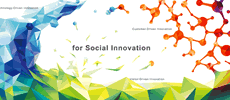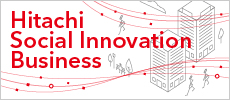Digital EngineeringDigital Systems & Services
1. Digital Engineering Business for Accelerating Customer DX
Hitachi established its Digital Engineering Business Unit in April 2023. Its goal is to build on Hitachi’s successes in digital engineering, a field that is recognized as fundamental to the Lumada’s growth cycle. By consolidating resources from across Hitachi, not least of which are those of the US company GlobalLogic Inc. acquired in 2021, the business unit will strengthen its crucial role in co-creation with customers, working to identify customer management issues and needs as it supplies solutions that leverage digital technology and data. The intention is to draw on synergies with Hitachi divisions strong in the other steps of the Lumada’s growth cycle (system integration, connected products, and managed services) to achieve social innovation through ongoing efforts to resolve complex challenges.
The digital engineering business will engage in co-creation based around customers and digital transformation (DX) by following the three key steps of: (1) Consulting, (2) Design and prototyping, and (3) System development and application delivery.
The following five articles use these three steps as a common theme to describe the work of the Digital Engineering Business Unit. In the case of consulting (1), an article describes how Hitachi is approaching DX market development in Japan. Similarly, work that derives from design and prototyping (2) includes case studies in generative artificial intelligence (AI) and co-creation by GlobalLogic Japan, while a case study of co-creation by the Lumada Innovation Hub Tokyo, Hitachi’s flagship site for co-creation, involves support for all three steps.
[01-2]Sequence of steps for DX through co-creation with customers![[01-2]Sequence of steps for DX through co-creation with customers](/rev/archive/2024/r2024_01/01/image/fig_01-2.png)
2. Engineering Enhanced Corporate Value for Customers
Hitachi sees digital engineering as a means of enhancing corporate value for customers. This work involves consultants, designers, and data scientists who understand the customer’s situation and expectations. These digital professionals partner with customers to plan out their journey for resolving management issues and enhancing corporate value, using co-creation to develop new businesses and create value. Corporate value is enhanced by undertaking co-creation as “One Hitachi,” going beyond the existing boundaries of consulting and IT to incorporate OT fields such as infrastructure and energy.
Hitachi is pursuing two different approaches as it seeks to accelerate this co-creation with customers. The first is a strengthening of partnerships with private equity and other financial institutions, especially in the area of customer DX for enhancing corporate value. The second approach focuses on domain DX that offers a high potential for value creation through innovations that combine Hitachi’s OT (domain knowledge) with its IT for digitalization and AI. Along with its existing customers, Hitachi is taking active steps to expand its work with new clients.
3. Case Study Using Lumada Innovation Hub Tokyo for Co-creation with Customers from Upstream Consulting to Delivery
In partnership with Sompo Himawari Life Insurance Inc. and medical institutions specializing in cancer treatment, Hitachi has been working on “Managed Service for Cancer” data that involves co-creation with professionals and leverages the services of Lumada Innovation Hub Tokyo. The managed service was launched in November 2022 as a new function in a Sompo Himawari Life Insurance application that helps people make lifestyle improvements.
Design thinkers and data scientists at Lumada Innovation Hub Tokyo participated in the co-creation process by creating a prototype screen application to improve service value and user convenience. The user feedback was positive, with 84% expressing an intention of continuing with the program.
Future plans include building a healthcare ecosystem by redeploying the assets acquired through this co-creation in other fields.
4. Value Creation and Productivity Improvement Using Generative AI
The shrinking workforce that comes with Japan’s low birthrate and rapidly aging population has major implications for the economy and society, creating a need for innovative new productivity improvements. Given its ability to respond to Japanese and other natural language prompts with text that could easily have been written by a human being, generative AI, the technology behind services like ChatGPT, can be a powerful tool for assisting human knowledge work. Given that Japanese companies are rich in institutional knowledge and individual expertise, teaching this knowledge to generative AIs has the potential to massively boost productivity. Unfortunately, use of generative AI also comes with many risks, including issues with copyright, privacy, and AI ethics.
In response, Hitachi established its Generative AI Center in May 2023, bringing together experts from across a range of fields to work on knowledge acquisition and on putting in-house usage guidelines and infrastructure in place. It also provides client consulting services and infrastructure establishment and support services that draw on Hitachi’s in-house knowledge. Along with rapid advances in the commercialization of generative AI, Hitachi is working to boost productivity across the group as well as on producing use cases and solutions for customers.
5. Deployment of Assets through Lumada Solution Hub
Hitachi has in the past worked with a wide variety of customers on co-creation projects that have transcended the borders between industries and companies. The extensive assets *1 acquired through this work, encompassing use cases, solutions, and domain knowledge among other things, have been brought together under the auspices of the Lumada Solution Hub to facilitate their use across the different divisions of Hitachi. The intention is to use the knowledge acquired from this work as a starting point for the deployment of these Hitachi assets at companies seeking to make themselves DX-ready *2.
One example is that augmenting existing large language models with Hitachi’s own proprietary information and domain knowledge will be essential if applications that utilize the topical technology of generative AI are to be put to good use. A common practice for improving the accuracy of generative AI is to supplement the information held within the large language model with information from external sources. Treating proprietary information and domain knowledge as assets that can be collated and shared, in other words, could well prove crucial to the successful use of generative AI and to becoming DX-ready.
At Hitachi, it is Lumada Solution Hub that fulfills this role. Hitachi intends to help improve value delivery to customers by pursuing both the commercial deployment of new technologies like generative AI and the leveraging of assets.
- *1
- Knowledge in forms that include use cases, solutions, products and services, and system architectures.
- *2
- Companies are DX-ready when they have taken the preparatory steps needed to transform their own businesses through digital technology.
- Source: Guide for applying to participate in the national DX certification initiative (IT Innovation Division of the Ministry of Economy, Trade and Industry and the Information-technology Promotion Agency, Japan)

![[01-1]Lumada’s growth cycle](/rev/archive/2024/r2024_01/01/image/fig_01-1.png)
![[02]Digital engineering activities](/rev/archive/2024/r2024_01/01/image/fig_02.png)
![[03]Business model developed by “Vision Design Service”](/rev/archive/2024/r2024_01/01/image/fig_03.png)
![[04]Role of Generative AI Center](/rev/archive/2024/r2024_01/01/image/fig_04.png)
![[05]Lumada Solution Hub’s role in Lumada growth cycle](/rev/archive/2024/r2024_01/01/image/fig_05.png)


